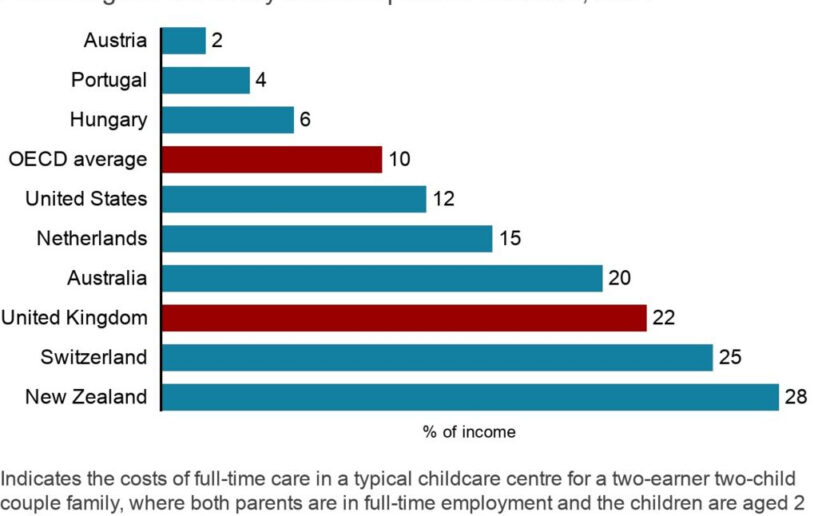Plans to increase the number of two-year-olds nurseries and childminders can look after were set out in July.
The government says allowing one adult to look after five, rather than four, children could help to bring down costs for parents.
What are the different types of childcare provision in the UK?
The main types of paid childcare are:
- Childminders, who are based in their own home and look after children there
- Nurseries, which look after children from a few months old up to school age
- Preschools, which offer structured classes to prepare for starting school
- Nannies,who provide childcare in the family home
How expensive is childcare in the UK?
The average cost of full-time nursery for a child aged under two in the UK is around £14,000 a year.
Separate research carried out by the Trade Union Congress showed that part-time nursery fees have increased by 44% since 2010 – an increase of over £2,000 a year.
The Organisation for Economic Co-operation and Development (OECD) places the UK as the third most expensive country among its members, behind Switzerland and New Zealand.
The figures are based on a family with two children aged two and three attending centre-based childcare for at least 40 hours a week. They also take into account the different types of state support offered in each country.
Will changing the childcare ratio reduce childcare costs?
Currently, the rules in England, Wales and Northern Ireland are to have one carer for every four children aged two.
- Parents asked about change to nursery ratios
- Nurseries resist staff looking after more children
- Reality Check: Do UK parents pay the most for childcare?
The government is proposing to increase this number to five children in England, as it is in Scotland.
It says the change could reduce childcare costs by up to 15%, about £40 a week.
However, critics of the plan argue a greater proportion of Scottish carers have a higher level of child care qualification than their English counterparts, and are therefore more qualified to look after a larger group of young children.
A study by the Institute for Fiscal Studies warned that reducing childcare costs would mainly benefit higher-earning parents who spend the most on childcare. The report recommend that the government should improve the take-up of existing childcare support by lower-earning families, many of whom are unaware of the full range of support available.
Why are childcare costs so expensive?
Staffing costs accounts for around 82% of the total cost of running school-based childcare, such as a pre-school, according to the Department for Education. This includes wages, national insurance and pension contributions.
The UK’s relatively tight carer to child ratio adds to these high staffing costs. Sweden, in contrast, has no ratios in place for childcare and costs are much cheaper as a result.
Compared to other countries, the UK has fewer policies in place to ensure widespread access to affordable, or free, childcare.
The cost of childcare will vary between the different types of provider – according to the Money Helper website, child minders are cheaper than nurseries, with nanny provision considerably more expensive.
What help is available with childcare costs?
Three and four year-olds are entitled to some free childcare provision throughout the UK, with different schemes in England, Scotland, Wales and Northern Ireland.
It needs to be “approved childcare”. This means the provider has to be registered, with different requirements for each childcare type.
In England, all three and four year olds get at least 15 hours of free childcare per week, for 38 weeks of the year. This increases to 30 hours for working parents, provided their income meets the eligibility criteria.
Two-year-olds in England are also eligible for 15 hours of free childcare under certain circumstances, for example if the family receives Universal Credit or the child is in foster care.
As well as free hours, tax-free childcare is available throughout the UK. Under this scheme the government pays £2 into an account for every £8 the family puts in, up to a value of £2,000 per child per year.
Eligible families in England can claim child benefit for children aged 16 and under. This amounts to £21.80 per week for the first child and £14.45 per week for additional children, although the benefit cap may limit the amount of child benefit a family can receive.

